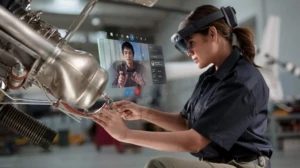
Sajith Sahadevan articles
Sajith Sahadevan
Senior Product Marketing Manager, Dynamics 365 Field Service


Smart cities: Innovation, inclusion, and IoT
This week, at Smart City Expo—in Barcelona—we’re excited to showcase new innovations that will transform Smart City programs worldwide. Smart cities are no longer science fiction. They’re here and now and growing quickly as the Internet of Things (IoT) expands and spreads throughout municipalities around the globe.
Fuel your field service with mixed reality
Technology is transforming quickly and evolving at an accelerated pace. That evolution is significantly impacting how we work, what we work on, and how we serve our customers. As technology is speeding forward, creating greater efficiencies, it’s also pushing bleeding edge technologies into the mainstream.
Building smart cities of the future with Microsoft
The term smart city usually focuses on infrastructure and how big data and information technology can be used to better manage urban assets such as waterworks, roads, and public transit. Smart denotes physical assets connected to the Internet of Things (IoT) via sensor technology streaming data such as smart parking meters or smart streetlights.
Video series: Transform field service with Dynamics 365
Field Technologies Online reported that 53 percent of field service organizations cite ensuring mobile workers are operating at optimal efficiency and productivity as their number one challenge. This pain point bleeds into other challenges, including the respondents second largest concern of meeting growing customer demands and expectations at 46 percent.
How Microsoft Dynamics 365 for Field Service impacts the bottom line
A new study by Forrester Consulting calculates the potential return on investment (ROI) for implementing Microsoft Dynamics 365 for Field Service can help organizations realize benefits of $1.8M over three years, adding up to a net present value (NPV) of $1.4M and an ROI of 363 percent.Transition from a product to service model with connected field service
Many manufacturing organizations are transitioning from a traditional product business model to an “as-a-service” business model—including flexible consumption models (FCMs) and “Anything-as-a-service (XaaS)—that lets them pay for what they use.Intelligent field service at Hannover Messe
As the manufacturing marketplace continues to evolve, so do customer expectations. Customers expect faster and faster response times and improved asset availability. To meet these growing demands, manufacturers need to transform field service to increase efficiency and ensure a first-time fix.Elevate your customer experience with field service first-time fix rate
Service organizations are continually challenged to meet rising customer expectations. It often seems like creating a positive customer experience and growing customer engagement are moving targets. And confusion arises as these terms are often used interchangeably. Understanding the difference is the first step in enhancing the customer experience and customer engagement.
